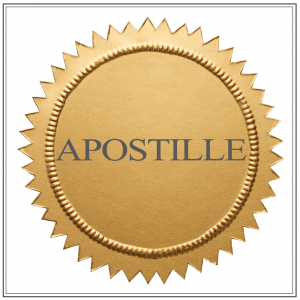
APOSTILLE FAQs:
Q1: What is an apostilles?
A: An apostille is a form of authentication or certification issued by a competent authority in a country that is a party to the Apostille Convention. It verifies the authenticity of a public document issued in one country. It ensures its recognition in another country that is also a party to the convention.
Q2: What types of documents can be apostilled?
A: Generally, public documents issued by government authorities can be apostilled. This includes documents such as birth certificates, marriage certificates, educational diplomas, notarized documents, court documents, and more. However, the specific requirements for apostilling documents can vary between countries.
Q3: Why do I need an apostilles?
A: An apostille is often required when using a public document issued in one country in another country that is a party to the Apostille Convention. It eliminates the need for further legalization or authentication procedures. It ensures the document’s validity and acceptance in the receiving country.
Q4: Who can issue an apostilles?
A: Apostilles are typically issued by a designated competent authority in the country where the document was issued. This authority is usually a government office or department responsible for authenticating public documents. The specific authority can vary between countries.
Q5: How do I obtain an apostille?
A: The process for obtaining an apostille depends on the country, where the document was issued. In general, you will need to submit the original document to the designated competent authority along with any required application forms, fees, and supporting documents. The authority will then verify the document’s authenticity and attach the apostille certificate.
Q6: Can I obtain an apostille for a document issued in a different country?
A: No, you cannot obtain an apostille directly for a document issued in a country other than the one where the document was originally issued. The apostille must be obtained from the competent authority in the same country that issued the document. Once the document has been apostilled in its country of origin, it can be recognized in other countries that are party to the Apostille Convention.
Q7: How long does it take to obtain an apostille?
A: The processing time for obtaining an apostille can vary depending on the country and the competent authority. Some authorities may offer expedited processing for an additional fee. It’s advisable to check with the competent authority or consult their website for information on processing times.
Q8: Can any document be apostilled?
A: No, not all documents are eligible for apostille. Apostilles are typically issued for public documents that are intended for use in another country. Private or personal documents that are not issued by a government authority may not be eligible for an apostille. It’s best to consult with the competent authority or seek legal advice to determine if your specific document can be apostilled.
Q9: Is an apostille the same as a notarization?
A: No, an apostille is not the same as a notarization. Notarization is the process of having a notary public verify the authenticity of a signature on a document. An apostille, on the other hand, verifies the authenticity of the entire public document itself, including any signatures, seals, or stamps affixed to it.
Q10: Which countries are members of the Apostille Convention?
A: As of my knowledge cutoff in September 2021, there are currently 118 countries that are members of the Apostille Convention, including most countries in Europe, North and South America, Asia, and Oceania. However, it’s advisable to check the latest information and the specific requirements of the countries involved, as membership and regulations can change over time.
Please note that apostille requirements and procedures can vary between countries. It is important to consult with the relevant authorities or seek legal advice for accurate and up-to-date information in your specific situation.
**Servicing the New York City Tri-State Area- the New York City 5 boroughs (Queens, Brooklyn, Manhattan, Bronx, Staten Island,) Nassau County, Suffolk County, and surrounding areas.
